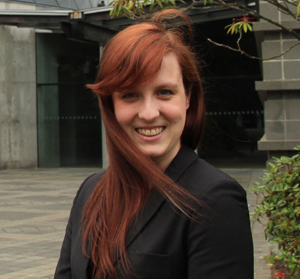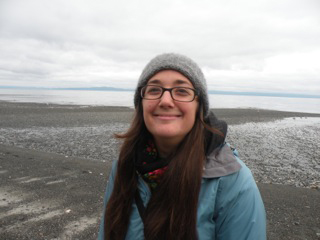Backdrop for the experience: Molly McFaul in Conversation with Anna Maxymiw

Malahat volunteer Molly McFaul talks with issue #182 (Spring, 2013) author Anna Maxymiw about her creative nonfiction story, "The Shipping Platform."
You reference Peter Pan in the Shadow Boxing segment on your blog. This has been one of my favourite books since adolescence. You mention that it is an incredibly dark book for children and this is true. What are some books that you loved for a child’s reasons when you were younger that resonate with you in different ways in your adulthood?
My mother and father were (and are) both rad, because they always encouraged me to read beyond my comfort zone. I never actually read Peter Pan as a child, but there were plenty of other weird and dark books: Grimms’ Fairy Tales, a terrifying book of Ukrainian fairy tales called How Ivan Went To See The Sun, His Dark Materials trilogy by Philip Pullman. But the writer that stands out the most is Francesca Lia Block. Block writes strange, lush stories about life in Los Angeles. I read her first book – Weetzie Bat – when I was younger, and when I look back on it, I realize how very grown-up the book is. Two of the main characters are gay men, and they live in a house with Weetzie, the titular eighteen-year-old female character. The book was written in 1989, right in the middle of the AIDS crisis, and therefore Block continually hints at how gay men are going missing, how these deaths are rampant, and how that social and political environment affects the makeshift family that these characters have formed. There’s sex, there’s confusion, there’s a baby with three fathers, there are Valium pills and feathered headdresses and witches, and an overarching theme of glorious wildness.
You mention boxing in the same post and that many challenges you face in writing you feel in boxing as well. Can you elaborate on this sentiment?
I should probably start by saying that I don’t consider myself a boxer—that would probably be insulting to the people who box more than once a week. I’ve never sparred with another person! That being said, I have a history of playing competitive or aggressive sports—hockey, ringette, football, weight lifting—and I think that’s related to boxing in that it’s all tough physical activity.
I think a lot of parallels can be drawn between physical activity and writing, and I think it’s important to do both (if only to help decrease the depression and anxiety that often results from jags of intense writing). Sometimes I feel uncomfortable looking at myself in the mirror while shadow boxing or dead lifting, and sometimes I used to feel scared taking a shot on net in ringette or blocking a big opponent in football. I think it’s because performance is so much a mental game. And it’s the same when I’m writing something that could be considered controversial or crude. I get a mental block. It’s avoiding the mirror, avoiding the glory or the truth. But when you push through—when you up your squat weight or bang out the sex scene you were scared of writing—you force yourself out of the plateau you were stagnating on. And that’s rewarding.
This piece is specifically about the blatant line drawn between the male and the female and their expected places in a functional workplace. Have you experienced many blatant (or perhaps not so blatant) lines to be crossed as a female author?
I haven’t so far. I have found, though, that my writing is pretty specific, and not every magazine or market is going to take to it or want to publish it. I get odd bursts of bravery when writing and so I don’t shy away from taboo topics in my poetry or nonfiction. I’ve found that not everybody—reader or editor or writing colleague—loves this.
The summer you spent at this fly-in fishing lodge seems to have been an incredibly inspirational experience that is worth writing about. Do you have several destinations in mind that you would like to travel to in order to write about?
It’s funny, because this summer at the lodge happened three years ago! It’s only now that the stories are coming out. To be honest, I think it’s less about a destination than it is about an experience. I’m not a person who hunts down a trip or an experience, who lusts for risk, or has a serious case of wanderlust.
True, the destination was incredibly worthy of being written about—Northern Ontario is one of the most beautiful places I’ve been, and that’s not me being grandiose. It’s a stunning, harsh environment. But I think what is often more interesting—and at least what is more interesting for me to write about—is the minutiae between people, the things that could potentially be considered mundane but aren’t. The improbable hilarity of the chores we had to do, the guests we met and laughed with, the jokes we told to each other at the breakfast table. I feel like a destination or an environment is mostly a backdrop for the experience that then gets drawn out of us.
Can you think of an initial incident that caused you to pursue writing?
Not really—I just remember always doing it! I liked to write on the computer, though I distinctly remember being bummed out when a teacher told me that I had to push the space bar between each typed word—I remember thinking that that would slow me down. In Grade 1, though, I did win a Young Authors Award for a poem I wrote about snow. (Typical Canadiana.) I remember rhyming “swirling” and “twirling” and that being exciting.

Molly McFaul
* * * * * * * *
Read "The Shipping Platform," by Anna Maxymiw here.









